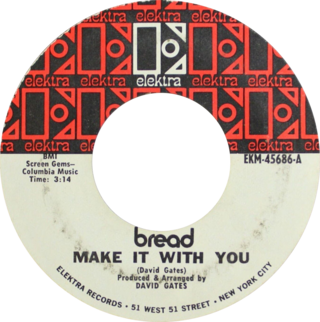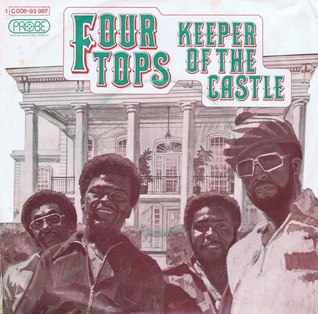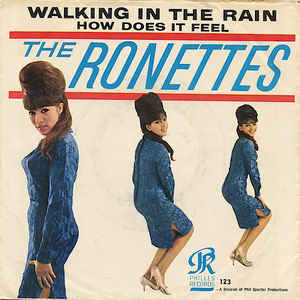
"Controversy" is a song by American musician Prince, the lead single and title track to his 1981 album. The song addresses speculation about Prince at the time such as his sexuality, gender, religion, and racial background, and how he could not understand the curiosity surrounding him.

"Didn't I (Blow Your Mind This Time)" is a song co-written by record producer Thom Bell and William Hart, lead singer of the American R&B/Soul vocal group the Delfonics. It was released by the group in 1969 on the Philly Groove record label and is regarded as a classic, winning a Grammy Award for Best R&B Vocal Performance by a Duo or Group.

"Until You Come Back to Me (That's What I'm Gonna Do)" is a song written by Morris Broadnax, Clarence Paul, and Stevie Wonder. The song was originally recorded by Stevie Wonder in 1967, but his version was not released as a single and did not appear on an album until 1977's anthology Looking Back. The best-known version of this song is the 1973 release by Aretha Franklin, who had a million-selling top 10 hit on Billboard charts. The song reached No. 1 on the R&B chart and No. 3 on the Hot 100 chart in 1974. It became an RIAA Gold record.

"Summer Breeze" is a song written and originally recorded by American soft rock duo Seals and Crofts. It is the title track of their fourth studio album, and was released as the album's lead single in August 1972. The song reached No. 6 on the Billboard Hot 100 chart in the US. In 2013, it was ranked No. 13 in Rolling Stone′s "Best Summer Songs of All Time". The song also became a hit for the Isley Brothers in 1974.

"Sideshow" is a song recorded by American R&B soul vocal quintet Blue Magic, released in 1974. It was first released on the album Blue Magic and when issued as a single it sold over a million copies, going to No.1 R&B in April 1974 and No.8 pop in the United States in that summer. Billboard ranked it as the No.19 song for 1974. In the Canadian Year-end chart, it was No.77.

"Shake Your Groove Thing" is a song by disco duo Peaches & Herb. The single reached No. 5 on the U.S. Billboard Hot 100 and No. 4 on the Billboard R&B Chart. It also reached No. 2 for four weeks on the Billboard Disco chart in 1978. The song spent 22 weeks on the American charts and became a Gold record.

"Make It with You" is a song written by David Gates and originally recorded by American pop-rock group Bread, of which Gates was a member. Gates and drummer Mike Botts are the only members of the group to appear on the recording, which was Bread's only No.1 hit on the Billboard Hot 100 chart.

"Another Star" is a song written and performed by Stevie Wonder from his 1976 album Songs in the Key of Life. It is the final track on side four of the double LP. The flute player Bobbi Humphrey appears in the last section of the song.

"Take Me in Your Arms (Rock Me a Little While)" is a song written by the premier Motown songwriting/production team of the 1960s Holland–Dozier–Holland. The first hit recording was sung by Kim Weston in 1965. It was most popular in 1975 when it was recorded by the Doobie Brothers.
"I Don't Blame You At All" was a 1971 R&B song by The Miracles on Motown Records' Tamla label. It was composed by Miracles lead singer, William "Smokey" Robinson, produced by Robinson and Terry "Buzzy" Johnson, and was taken from their album, One Dozen Roses. This song was actually the follow-up hit to their #1 smash, "The Tears of a Clown", and reached the Top 20 of the Billboard Hot 100, charting at #18, and the Top 10 of the Billboard R&B chart, peaking at #7. It was also a Top 20 hit in the UK, reaching #11 on the British charts that year. It is also noted as the group's last Top 20 pop hit before Smokey Robinson's departure from The Miracles the following year, and was performed by the group on Dick Clark's American Bandstand on an episode dated July 10, 1971.

"Keeper of the Castle" is a song recorded and released by American singing group the Four Tops, notable as the first hit the group scored on the ABC-Dunhill label after leaving Motown in 1972. The song, a social commentary on men's roles in relationships, was co-written by Dennis Lambert, who also produced the song and other songs off their album of the same name.

"The Best Disco in Town" is a 1976 crossover disco single by Philadelphia-based group, The Ritchie Family. In the United States, the single was a top 20 hit on both the soul and pop charts. "The Best Disco in Town" went to number one for one week on the disco/dance chart.

"Keep on Dancin'" is a 1979 single by Gary's Gang, a disco group, from Queens, New York. Their debut release of "Keep on Dancin'" was their most successful.

"Somethin' 'Bout You Baby I Like" is a popular song written by guitarist Richard Supa in the early 1970s. The version by Tom Jones reached No. 36 in the UK in 1974. Glen Campbell and Rita Coolidge reached No. 42 in the US with their recording of the song in 1980.

"Walking in the Rain" is a song written by Barry Mann, Phil Spector, and Cynthia Weil. It was originally recorded by the girl group the Ronettes in 1964 who had a charting hit with their version. Jay and the Americans released a charting hit cover of the song in 1969. The song has since been recorded by many other artists over the years, including the Walker Brothers.

"Next Door to an Angel" is a rock and pop song written by Neil Sedaka and Howard Greenfield and recorded by Neil Sedaka in 1962. It was issued by RCA Victor Records. It reached No. 5 on the Billboard Hot 100 in late 1962. "Next Door to an Angel" also went to No. 19 on the Hot R&B Singles chart. It was Sedaka's last appearance on the American Top 10 until "Laughter in the Rain" in late 1974.

"Armed and Extremely Dangerous" is a 1973 song by American girl group First Choice from their album Armed and Extremely Dangerous. It is their highest-charting single in the US and is arguably the band's most well-known song.

"You Came, You Saw, You Conquered!" is a 1969 song by the Ronettes. It was their final charting U.S. hit, reaching #108 Billboard and #92 Cash Box. In Canada, the song peaked at #73 for two weeks. It was the first of a series of non-album single releases by the group.

"Soul Deep" is a song originally recorded by Robbie Lane and the Disciples in 1966, but best known by a recorded version by The Box Tops. It was the third of three singles released from their 1969 Dimensions LP. Lead vocals were provided by Alex Chilton.

"Don't Throw It All Away" is a song written by British musician Gary Benson and first released by the Shadows on their 1975 album Specs Appeal. Benson released his version as a single later the same year, which reached number 20 on the UK Singles Chart in the fall of 1975.


















